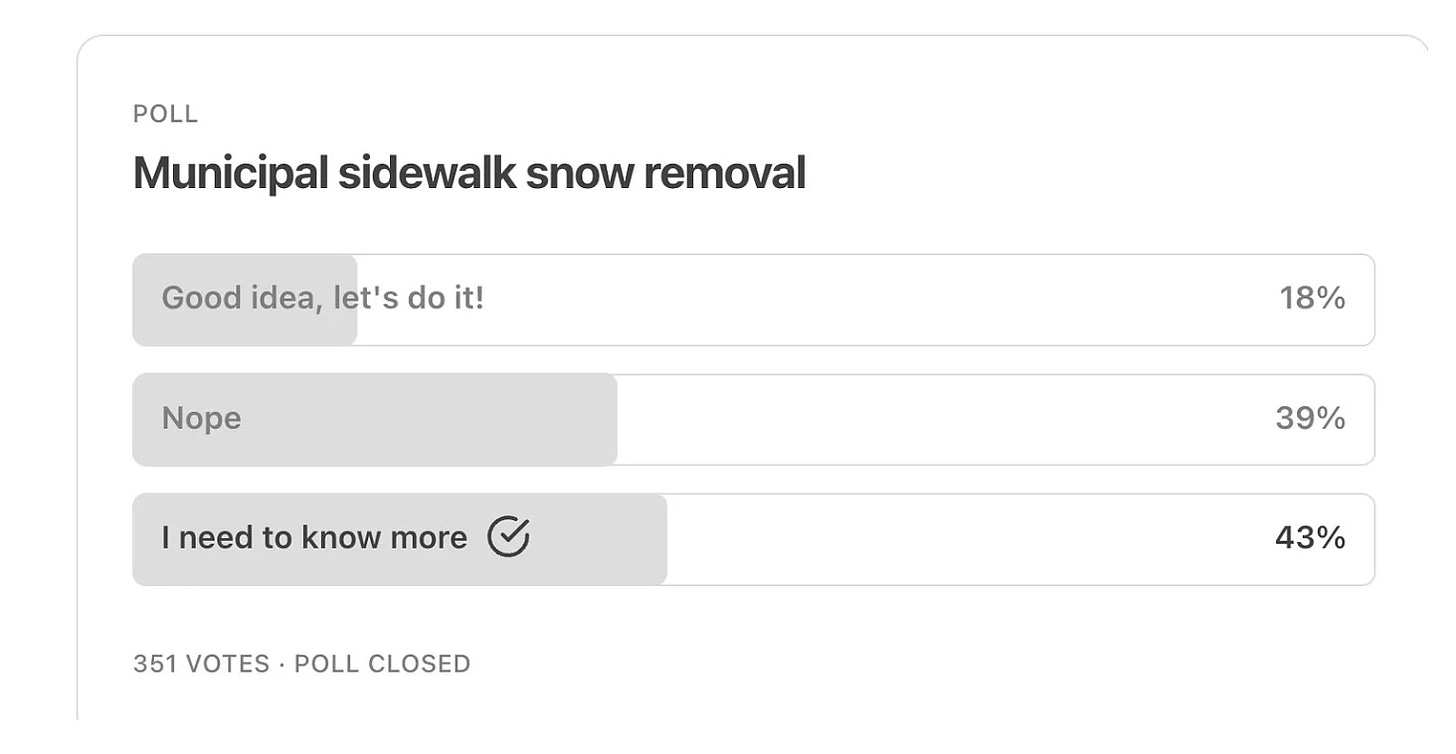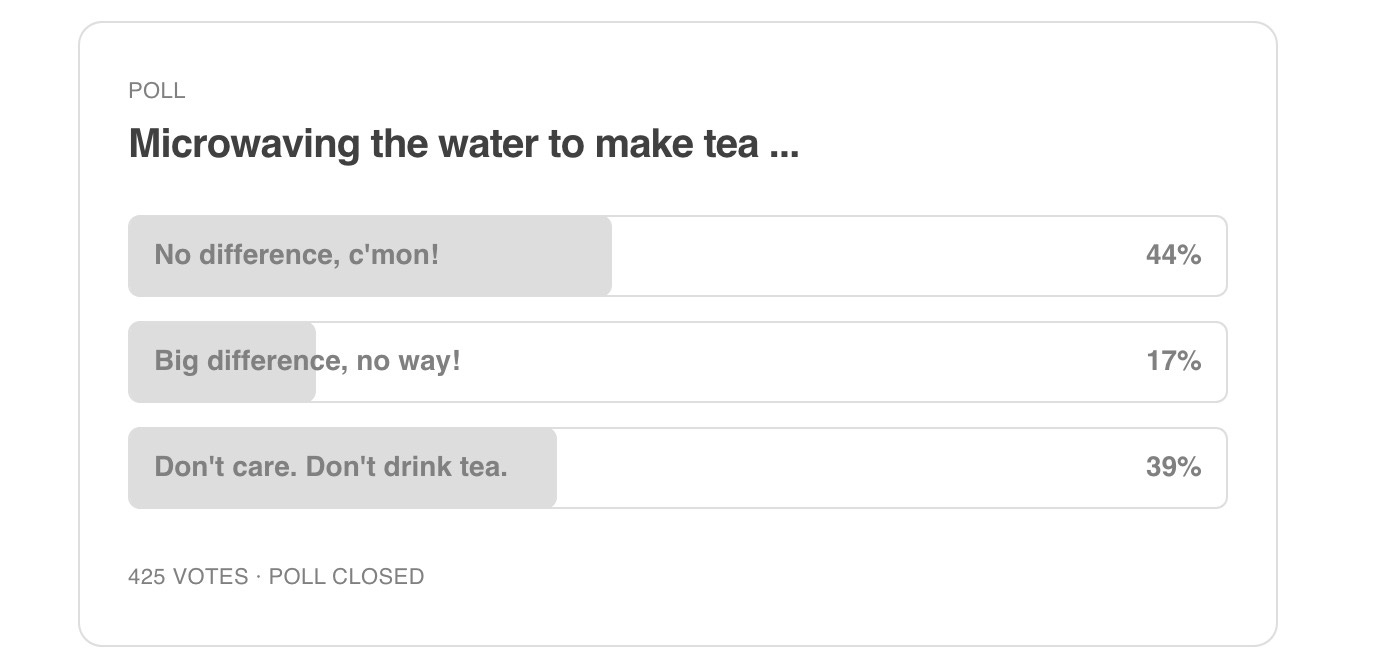Picayune Plus: Shelter evictions delayed, to no one's surprise
& readers share their thoughts on municipal sidewalk shoveling and more
To read this issue in your browser, click on the headline above.
Eric Zorn is a former opinion columnist for the Chicago Tribune. Find a longer bio and contact information here. This issue exceeds in size the maximum length for a standard email. To read the entire issue in your browser, click on the headline link above. Paid subscribers receive each Picayune Plus in their email inbox each Tuesday, are part of our civil and productive commenting community and enjoy the sublime satisfaction of supporting this enterprise.
Tuesdays at 11:30 a.m. I talk with WGN-AM 720 host John Williams about what’s making news and likely to be grist for the PS mill. The WGN listen-live link is here.
Eviction from migrant shelters delayed, as my prophecy foretold
OK, admittedly, I wasn’t exactly being daring last Thursday when I called Mayor Johnson’s plan to begin evicting migrants from city shelters on Feb. 1 — this Thursday— “pure bluster” because of the winter weather, and predicted “the deadline will keep getting pushed back.”
Even though Thursday’s forecast is for temperatures in the 40s, the average for that day is 25 degrees and we are very likely to see many very chilly days in February. The average temperature wont break 32 degrees until Feb. 25. It was always going to look indecent and cruel to shove asylum-seekers and their children out onto freezing streets, an insult to the “soul of Chicago” Johnson loves to talk about.
Sure enough on Monday came the story: “Facing heat, Mayor Johnson delays migrant shelter evictions to March or beyond.”
Nearly 2,000 people were set to be evicted had the policy been enforced as planned beginning Thursday. That number was expected to grow to about 6,000 people by the following week. … Johnson postponed that day of reckoning under pressure from more than a dozen alderpersons.
The average temperature in Chicago in mid-March is 39 degrees, which is not by any means balmy but it’s not brutal.
I’m sure most everyone is hoping, along with me, that we have found a more permanent solution to this housing problem by then. Even on luscious spring afternoons in late May, evictions will not be pretty.
Notes and comments from readers — lightly edited — along with my responses
Most of the correspondence and commentary last week had to do with my item asking questions about the notion — I wouldn’t yet call it a plan — to have the city of Chicago be responsible for clearing the sidewalks after a snowstorm.
Marc Martinez — There’s no reason to believe that the city can manage an effective and cost-effective sidewalk clearing service. I don't mind the idea of pilot projects, but simply running the pilots would tend to cement the concept that clearing sidewalks is a city responsibility. Also, if the motivation is clearing snow for those with needs, then why wouldn't the service include shoveling the paths to the front doors and exterior stairs?
Leon Greenberg — The city can't even clear side streets in a timely fashion nor do they even plow alleys, yet they want to tack on sidewalks? If our alderdopes want to make the streets and sidewalks safer, look to combat other safety issues, such as crime.
Jeff Biss — People gripe about taxes then want to do less as citizens! The government is us, people. Each person has an obligation to others as citizens and neighbors and it appears too many people have found it convenient to not do something that they should be doing -- shoveling the sidewalks. Those aren't the city's sidewalks, they're our sidewalks. People should do their part as neighbors and members of the community.
Dave Jones — Our neighborhood has a fairly simple sidewalk clearing plan after a storm: Those of us with snowblowers and/or able-bodied youths in the family get out and spend an hour or so to make the sidewalks passable. Oftentimes we take care of entry walks and stairs of older neighbors. Ward offices could support and encourage such hyper-local efforts by reimbursing snowblower users for gas and maintenance.
Zorn — I like the idea of helping to fund snowblowers for responsible community members and putting the alders’ offices in charge of keeping an eye on the program to make sure the work is getting done. We have several snowblower superheroes on our block and they routinely carve long paths through the snow. I’d be more than fine with the city paying them an annual stipend or even funding the purchase and upkeep on one or two snowblowers per block.
Rick Weiland — The trouble with having the city plow the sidewalks is that they can't be everywhere at once, and by the time the plows gets to your sidewalk, it'll already be packed down from foot traffic. Lots of citizens shoveling promptly will do a better job.
David Leitschuh — This is a very bad idea that looks good only through a leftist ideological perspective. Owning a property comes with a myriad of civic responsibilities, and cleaning the snow off sidewalks is just one of them. City takeoverof snow removal on sidewalks will simply be another political boondoggle benefiting connected people and the unions.
Zorn — Fewer than 1 in 5 respondents to my unscientific click survey registered enthusiasm for the idea:
Switching from gas to electric
Melinda A. K. — The idea that Chicago may ban natural gas connections for most new construction in the interest of lowering pollution has me wondering: Given that natural gas is used to generate some of our electricity, will it actually be better for the environment?
Marc Martinez — Some 52% of the electricity in Illinois is generated by nuclear, 22% by coal, 13% by natural gas, and12% from wind. Environmentally, gas is better than coal, wind is better than gas, and nukes are best. Requiring a transition to electric for any fossil fuel will require massive new generation capacity in addition to that required to replace the current coal and gas. In my opinion nukes are the best solution, but they are opposed by activists and weak-kneed politicians like our governor.
Zorn — I’m favorably disposed toward an increased reliance on nuclear power, the dangers and the storage issue notwithstanding. I recommend “Pandora’s Promise,” a documentary now on YouTube that outlines the controversy and the tradeoffs. I found it very persuasive. Yes, there are problems with nuclear, but there are more and bigger problems in the immediate future of our too-heavy reliance on fossil fuels.
Over decades if such a change in the law rolls out, the increased demand for electricity will be “massive.” But given that the proposal only applies to new construction and that alternative energy sources are coming online, we won’t need to increase generative capacity quickly.
DanFred — An often overlooked cost of switching to electric cooking from gas is that most of your pans, skillets, and pots will need to be replaced as their bottoms are not flat.
Zorn — I don’t know about “most,” but as I think of it, certainly some of our cookware has rounded bottoms that might not be ideal for electric ranges.
Microwaved your water for tea?
Steven Stine — You wrote that one objection to heating water for tea in the microwave oven is that the temperature of the water in the mug isn’t consistent. I find it difficult to believe that in an object with the tiny volume of a teacup there could be regions of widely varying temperatures. I drink herbal tea in the morning & heat my water in the microwave. The teabag floats on the top surface of the water which is supposedly hottest (therefore desirable). Nevertheless from now on I will stir the water to ensure that the temperature is even on the highly unlikely chance of uneven distribution of temperature.
Skeptic — I just now put 253 ml of cold tap water in a ceramic cup and put it in my microwave for 90 seconds. At the end I measured the temperatures near the top and near the bottom with my instant read thermometer. It was 180F near the top and 155F near the bottom. Of course, the water could be stirred to even out the temperature.
Zorn — Yes, this alleged temperature differential seems likely to resolve after a very short time, and that time would be hastened dramatically with stirring from a spoon. I invite the results of blind taste tests from tea fanciers. Meanwhile, more poll results:
The race for the White House
David O. — I will never vote for Donald Trump but if you don't think Biden was complicit in his son's millions in Ukraine and China windfalls, you are naive at best.
Hunter Biden made more than $10 million dealing with business interests in Ukraine and China over a five-year period. Joe Biden played golf and had meals with his son and his business partners, yet he denies ever conversing with them about Hunter’s business.
Zorn — Look, I'm sure that Hunter Biden got his "job" with Burisma, the Ukrainian energy company, and got in on Chinese money because of his last name. But I’ve yet to see any evidence that Joe ever interceded in Hunter's efforts to get jobs, payments, or contacts; or any evidence that Joe performed any official act or failed to perform an official act or benefited financially from any of Hunter's dealings. Relatives of powerful and rich people play off their famous last names all the time in and out of politics. The Trump children come to mind. Innuendo is not evidence.
And on the off chance that such evidence arises, I will ask when it was that Republicans in the thrall of a crooked grifter became so concerned about hinky business dealings.
Dianne Michels — I recommend you read “This Chair Rocks: A Manifesto Against Ageism” by Ashton Applewhite, to discover the unconscious biases embedded in our culture that use age as a viable and acceptable measure of a person’s ability to participate and contribute in our society. I am so disappointed you are so unaware.
Zorn —I haven’t read Applewhite’s arguments but I will say that we set age limits in our society based not on individual capacities but on observations of general tendencies of people in certain age groups. Certainly there are tens of thousand, maybe hundreds of thousands of 14-year-olds who are mature and well informed enough to cast independent votes, yet we don’t allow anyone to vote until they turn 18.
And while there are certainly plenty of octogenarians robust enough of mind and body to serve as president of the United States, there are equally certainly plenty of octogenarians who are either on the cusp of fading into senescence or well enough on their way that it would not be unwise to set an upper bound age limit for being sworn in as president.
I’m not confident that either Joe Biden or the increasingly erratic and rambling Donald Trump will be sharp enough for the next four years to be deemed of sound mind. So at the very least I’d like to see them subjected to batteries of tests administered by neutral physicians prior to the conventions or at least the elections, and for the full results of those tests to be made available to the public.
On the qualities you look for in your best friends
Jim Higgins — I loved your post about your parents' 70th anniversary. I wonder if your appreciation for the value of mutual respect in their relationship is something that comes with age. About five years ago I asked my then-22 year-old-daughter "What makes a best friend a best friend?”
Her answers: Humor, honesty, reliability, attitude and connection. What would your readers add to that?
Zorn — Let’s ask! I would add not only “respect” but “be interested in you” to this list, though that might fall under the heading of connection or perhaps attitude. A best friend — or, let’s say a good friend, as adults don’t really have “best” friends usually — is interested in what you’re doing, what you’re thinking, how you’re feeling.
What other adjectivess would you ascribe to great friends?
How about ‘Enby Mitzvah?’
Aviva Patt — In last week’s Land of Linkin’ you wrote that “B'nai Mitzvah” has become a gender-neutral term for the coming of age ceremony of non-binary Jews, mostly adolescents, who aren’t comfortable with “Bar Mitzvah,” the ceremony for males, or “Bat Mitzvah,” the ceremony for females. But “B’nai Mitzvah” is not a gender-neutral term. B'nai is the plural of ben, the Hebrew word for son. B'not is the plural form of bat, the Hebrew word for daughter. Neither word is gender-neutral. The non-gendered term adopted by Reform Judaism is "Kabbalat Mitzvah" which means acceptance of Judaism's religious obligations.
Zorn — I am ill-equipped to discuss Hebrew terminology and grammar. All I know is what I’ve found online posted by those who are very familiar with this and, while I can confirm that “Kabbalat Mitzvah” seems to be in some use for non-binary passage rites, I see many references to “B’nai Mitzvah” as well. Thanks for the additional info!
Helping hand?
Carole B. — I’m wondering if there is a good place to send money for helping with the migrants in Chicago.
Zorn — I found this from WTTW-Ch. 11: “Looking to Help Migrants and Unhoused Chicagoans This Winter? Here’s What the City Recommends.”
Word court: What to call members of Chicago’s City Council?
Garry Spelled Correctly — You have taken to referring to “alders" rather than “aldermen” or “alderpeople.” Please stop. An alder is a tree, and while most aldermen are dumber than trees, it still doesn't make them a tree!
Adair Small —"Alder" seems a perfectly good way to avoid the alderman/alderwoman conundrum to me!
Zorn — There are plenty of words with two meanings. “Crane,” for instance. “Feet.” “Letter.” “Date.” I have an aversion to gendered terms, but I also have an aversion to “-person” and “-people” suffixes where “-man” or “-men” was once common. To me, “alder” in context is short, gender inclusive and unambiguous.
Your thoughts?
On my notion to ban bottled water
Jay G — You wrote “If I made the laws, I’d ban single-use plastic water bottles.” I've never understood the concept of individual bottles of water — going back to when they first became a thing in the 1980s. I could not believe that so many consumers could be conned into paying for something that comes out of the tap for fractions of a penny per gallon. But in our climate-threatened world, I predict that due to the amount of energy consumed in transporting bottled water, governments are going to eventually clamp down. Think of how much energy is wasted and carbon introduced into the atmosphere due to merely transporting water.
Cases of soda and other drinks will be supplanted by syrups and concentrated versions of beverages and reconstituted at home. The same will be true of items like cleaning products. Be prepared for a future of buying everything in concentrate. People may raise issues about consistency — tap water around the country varies greatly — but those issues will get ironed out over the long haul.
Zorn — In places where the tap water is not safe to drink or has a funny taste,I can understand the impulse. But in most circumstances, a multi-use bottle filled at home will be equally healthy, taste the same and be way, way cheaper. Plus it’s better for the environment. I invite you to view the nearly six-minute trailer for “Tapped,” a 2009 documentary on the “scourge” of bottled water.
Meanwhile, your letter nods to a similarly urgent matter, in my view, and that is excess packaging. In 2019, the Canadian Broadcasting Corporation aired this feature report:
Two theories about the recent cuts in journalism
Jeff Pieler — You wrote about the startling number of layoffs in print media lately, and I wonder if the changing demographic of journalists and resulting embrace of “narrative” journalism isn’t a significant factor in the decline of print news. Does every story have to include editorial content or tell me what to think?
Zorn — The declines in print media are the result of declines in advertising — classified ads, movie ads and display ads are all down — that is related to audience migration to fragmented digital sources. The feedback loop on that is scary: Less money from advertisers means cuts in newsrooms which make the publications less robust which leads to circulation declines which leads to a drop in advertising rates which leads to … you get the idea.
The competition for attention has never been greater. Conventional journalism is competing with social media, speciality websites, podcasts, high-quality streaming TV and video games.
Is the downward spiral of audience engagement and advertising related to a different kind of storytelling from young journalists? I don’t think so. First, I don’t think news stories and news features are particularly opinionated or partisan. And second, I think readers and news consumers value well-edited, scrupulously factual journalism with a point of view; that makes an argument and defends its case or at least includes a lot of smart analysis.
Subscriber services
Several readers have written to ask what they can do so that their full names don’t appear with their comments. Here is the guidance from Substack on that:
Access your account settings page at https://substack.com/settings.
Edit your profile by changing the field for "Name."
Click “Save.”
Laurie H. — Please change my email address on my account.
Zorn— Because you asked nicely I’ve done it for you. But it’s easy to access your account settings page at https://substack.com/settings, click "Edit" next to your current email address, enter your new email address and save the changes.
Sherry K. I want to send a donation to Picayune Sentinel but I don't want to make it a recurring donation nor do I want to subscribe. How do I do that?
Zorn — Thank you for the thought. But, ridiculously, Substack doesn't offer this option. The closest option they offer is a one-time gift subscription that doesn’t result in recurring charges.
Ya gotta see these tweets!
Here are some funny visual images I've come across recently on social media. Enjoy, then evaluate:
Vote for your favorite. I’ll share the winner in Thursday’s main edition.
Usage note: To me, “tweet” has become a generic term for a short post on social media.
There’s still time to vote in the conventional Tweet of the Week poll!
Thank you for supporting the Picayune Sentinel. To help this publication grow, please consider spreading the word to friends, family, associates, neighbors and agreeable strangers.
Contact
You can email me here:
I read all the messages that come in, but I do most of my interacting with readers in the comments section beneath each issue.
Some of those letters I reprint and respond to in the Z-mail section of Tuesday’s Picayune Plus, which is delivered to paid subscribers and available to all readers later Tuesday. Check there for responses.
If you don’t want me to use the full name on your email or your comments, let me know how you’d like to be identified.
















"Alder" (in "alderman") is from an Old English word meaning a "patriarch" with its root in the word "old." Sorry.
Since there seems no escaping linguistic sexism or ageism ("elder" anyone?) why not Councilor--they are male and female, old and young but they are all on a Council and give counsel (wise or otherwise)?
Do alders embrace poplarism?